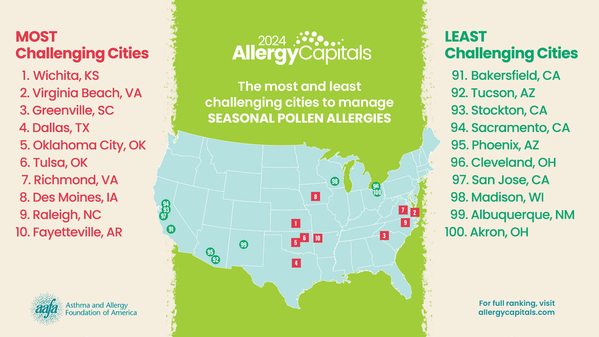VIRGINIA BEACH, Va. (WAVY) – On the Asthma and Allergy Foundation of America’s (AAFA) recently released 2024 Allergy Capitals™ report, Virginia Beach is listed among the top challenging cities for managing seasonal pollen allergies.
A pollen allergy is often referred to as “seasonal allergic rhinitis.” Symptoms include a runny nose, stuffy nose, sneezing, itchy nose, eyes, ears and mouth, red and watery eyes and swelling around the eyes. Exposure can also trigger an asthma attack in some people.

The ranking of the top 100 populated metro areas includes data from the previous year, based on:
- Tree, grass, and weed pollen scores
- Over-the-counter allergy medicine use
- Availability of board-certified allergists/immunologists
Wichita, Kansas tops the list for the second year straight.
You’re not imaging it; pollen seasons are starting earlier and are lasting longer. It’s happening because of climate change, according to the Centers for Disease Control and Prevention. The tree pollen allergy season usually starts around February, grass pollens around April, and ragweed in July.
If you are affected by pollen, there are steps you can take to manage your allergies. Although it can be difficult, the main thing is to limit your contact with pollen. Here are some ways to do that, according to the AAFA:
- Check pollen counts daily. A pollen count is how much pollen is in the air.
- Plan outdoor activities on low pollen days.
- Stay inside on high pollen days.
- When outside, wear sunglasses, a hat or head covering, and a mask.
- Remove your shoes before entering your home.
- Change and wash clothes after outdoor activities.
- Wipe furry animals off when they come inside or bathe them weekly.
- Shower before bed to keep pollen out of your bedding.
- Keep windows closed during pollen season or peak pollen times (usually midday).
- Use central air conditioning or air cleaners with a HEPA or CERTIFIED asthma & allergy friendly® filter, if possible.
- Clean bedding, floors, and fabric furniture once a week.
- Clean blinds, curtains, and washable rugs once a month.
The American Academy of Allergy, Asthma & Immunology’s National Allergy Bureau collects pollen and reports counts across the U.S. Click here to find a counter station. The closest one to Hampton Roads is in Washington, DC.
Doctors have two tests to diagnose a pollen allergy: a Skin Prick Test (SPT) and a Specific IgE Blood Test. You can work with your doctor to find allergy medicines and treatments that bring relief. There are both over-the-counter and prescription options.
For more tips, learn more about managing pollen allergies.




































































































